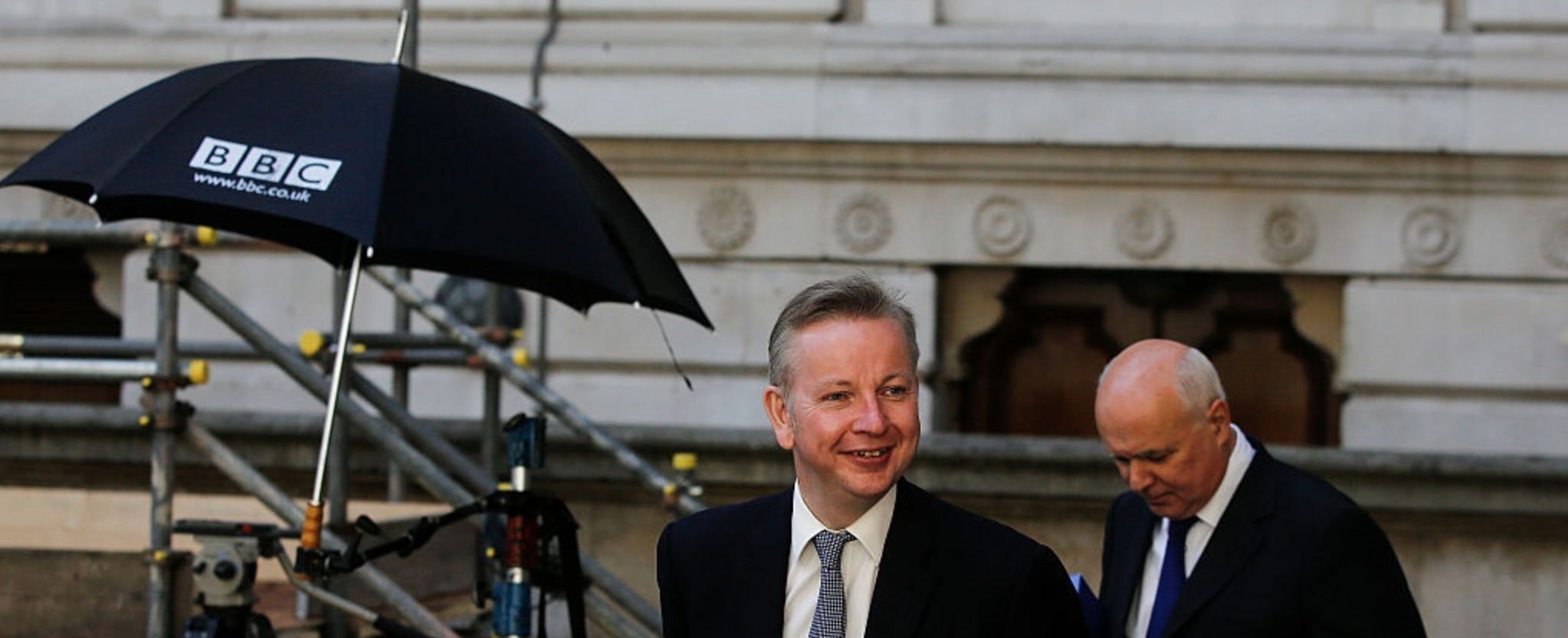The BBC has exclusively confirmed to INSURGE intelligence that a news report claiming to have discovered widespread extremism amongst Muslim Deobandi communities in Britain, was produced by a BBC editor who had secretly briefed Whitehall officials in February.
An INSURGE investigation published on Wednesday revealed that the BBC’s portrayal of Deobandi mosques in the UK was deeply misleading and inaccurate.
The BBC’s output consisted of a two-part radio show presented by Owen Bennett Jones, and a BBC magazine feature by assistant editor Innes Bowen, who is also the author of a book mapping Muslim communities in Britain, Medina in Birmingham, Najaf in Brent (2014)
Innes Bowen’s feature highlighted a 1993 tour of Deobandi mosques in the UK by an associate of Osama bin Laden, Pakistani terrorist Masood Azhar, but systematically failed to mention that Azhar’s activities at the time were being facilitated by American and British security services.
British intelligence had mobilised Azhar’s terror group, Harkat ul-Mujahideen (HuM), to recruit and dispatch British Muslims to the Balkans through the 1990s.
Bowen’s ‘investigation’, which was drawn on extensively in Jones’ Radio 4 show, used Azhar’s UK tour to imply widespread support for extremism amongst British Deobandi Muslims — but failed to mention that according to the BBC editor’s own research, Azhar had toured just 5% of Deobandi mosques in Britain.
My investigation noted that according to the Guardian, the author of the BBC feature, Innes Bowen, had repeated meetings in 2008 with government officials from the Home Office’s Organisation for Security and Counter-Terrorism (OSCT) regarding a radio production on al-Qaeda.
Her final production presented by BBC security correspondent Frank Gardner mirrored key parts of a confidential Home Office briefing document seen by the Guardian. At the time, the BBC denied there had been any compromising of editorial independence.
I had also cited confidential sources who claimed that earlier this year Bowen had met with and briefed Whitehall officials regarding her work on British Muslim communities, and specifically Deobandi Muslims.
In email correspondence through the BBC press office received Thursday, Innes Bowen confirmed that she had briefed Ministry of Justice officials in February at a previously undisclosed invite-only event in Whitehall.
The event was only for civil servants and not open to the public. It was hosted by the same government department that had conducted a review into Deobandi Muslim prison chaplains.
Coverage of the review by The Times claimed it would conclude that Deobandi Muslims have ‘anti-western values’ — claims that the UK prisons chief dismissed as “inaccurate, misleading and disgraceful.”
Innes Bowen’s Whitehall event included discussion of Muslim chaplaincy in the British prison system. In Bowen’s words:
“Since the publication of my book in July 2014 I have given a number of talks on its basic findings about which groups run UK mosques and seminaries. A civil servant who attended one such public talk at the Institute for Public Policy Research (IPPR) invited me to give the same talk on 12th February 2016 to civil servants at the Ministry of Justice/National Offender Management Service. This talk was widely publicised to civil servants and attended by around 50 people. The talk was based largely on the one I gave at the IPPR — but also referred to the findings published by Sophie Gilliat-Ray and Mansur Ali in their book Understanding Muslim Chaplaincy.”
Bowen’s talk at the Ministry of Justice occurred just five days after The Times (which last week featured her Masood Azhar story on the frontpage) cited anonymous Whitehall officials describing the Ministry of Justice review into Deobandi Muslim prison chaplains as promoting an ideology “contrary to British values and human rights.”
In other words, the same Ministry of Justice officials who had falsely briefed The Times on the alleged danger of Deobandis amongst Muslim chaplains, had also arranged in advance for the BBC’s Innes Bowen to address the department around the same time the story would break.
I asked Bowen whether she had “continued to have meetings and engagements with Whitehall counter-terrorism officials and civil servants” since the meetings in 2008, and engaged “with the government at all in relation to the subject of British Muslim Deobandi communities?”
Bowen did not directly answer these questions. She explicitly denied having had any contact with the OSCT’s Research, Information and Communications Unit (RICU) further to the meetings disclosed in 2008, but did not respond to the broader questions about meetings and engagements with government.
She added:
“The BBC’s research into the Deobandi network has been done completely independently of government: the BBC has not contributed to the government’s research in this area, neither has the BBC had access to any of the government’s research.”
I also asked whether her BBC team had been assured by British government officials of the accuracy of Aimen Dean’s personal story. She replied:
The BBC independently verified the key parts of Aimen Dean’s story before his account of his time spent in Al Qaeda/working for British intelligence was broadcast. We did this through two separate non-governmental sources.
However, due to INSURGE’s investigation — which exposed the incoherence in the BBC’s description of Aimen Dean — the BBC was forced yesterday evening to amend multiple stories featuring the former extremist.
As early as May 2015, Aimen Dean was described by the BBC as a “founder member” and “founding member” of al-Qaeda, a claim repeated verbatim by international media and other organisations featuring Dean, including The Times, CNN, The Australian, and numerous other outlets.
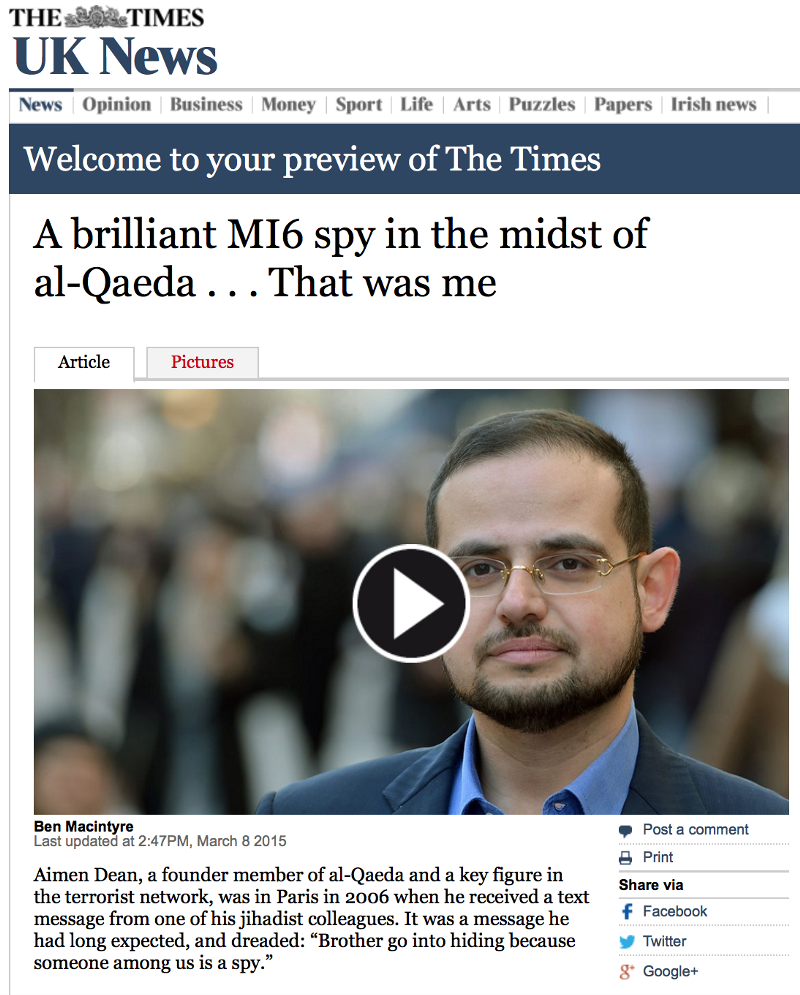
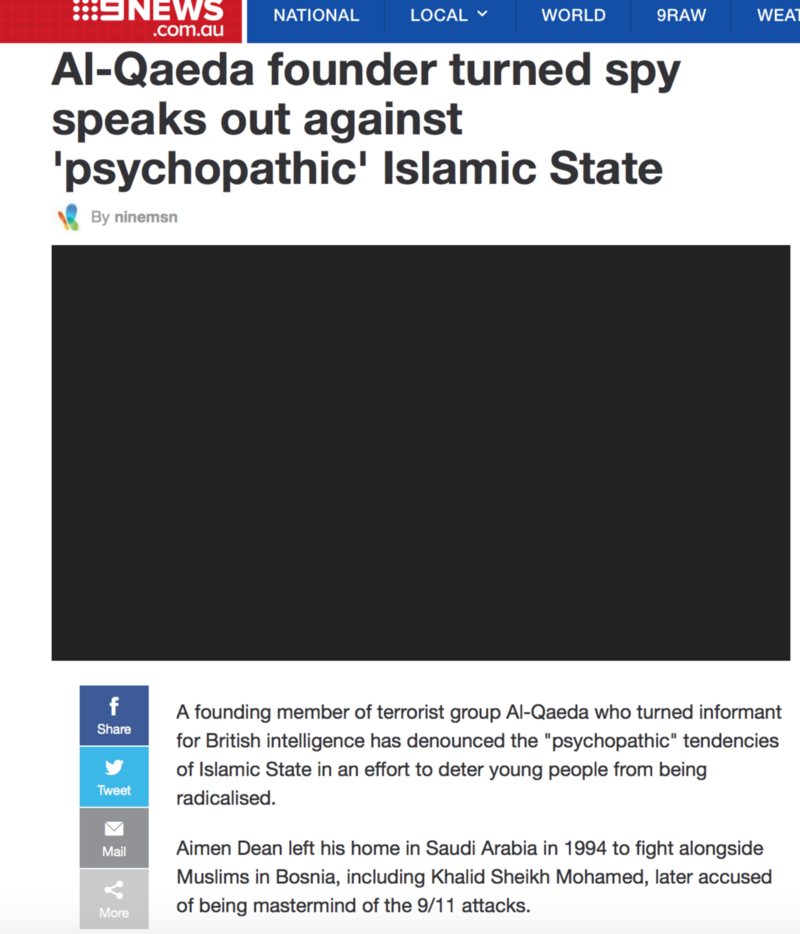
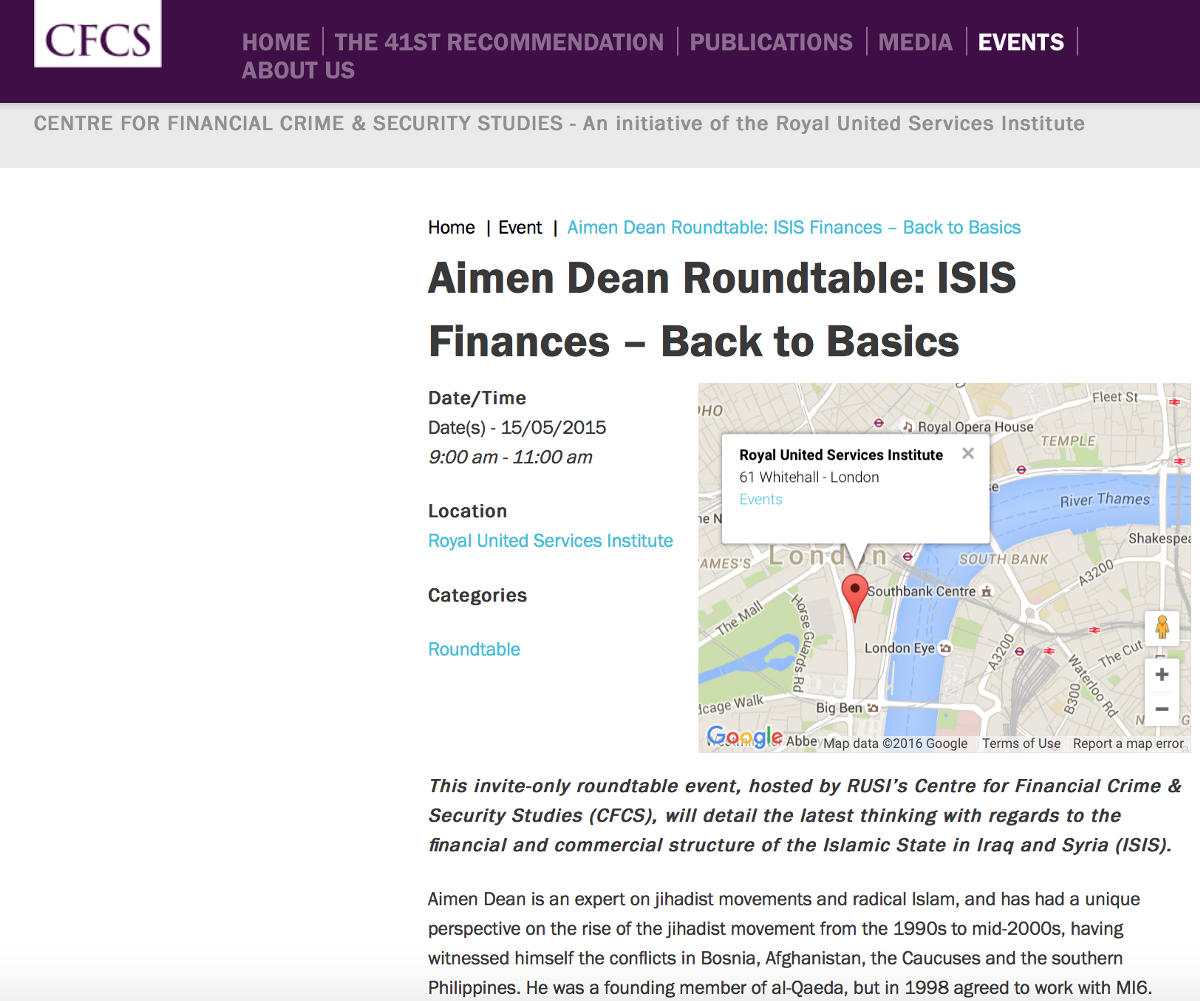

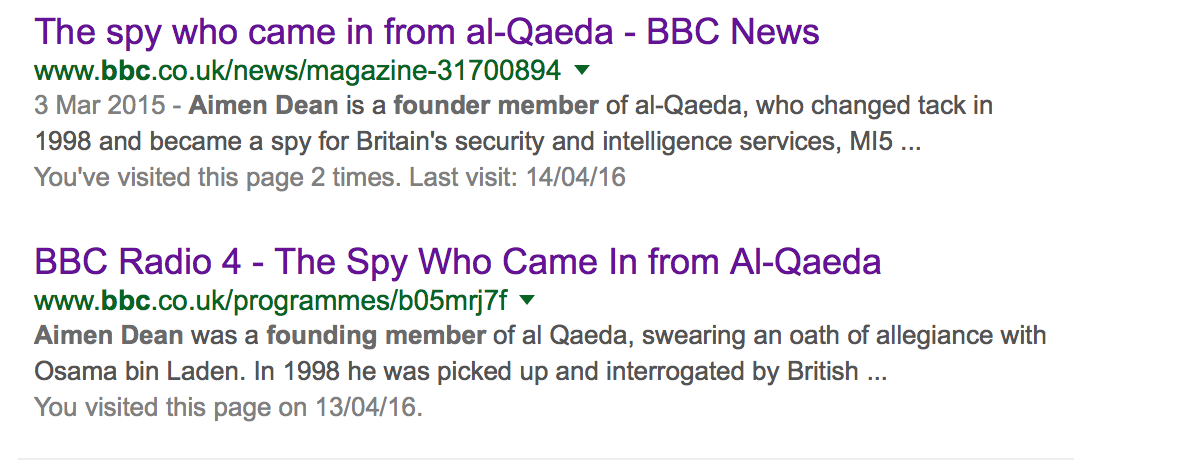
Aimen Dean now says that these characterisations are inaccurate:
“I never claimed on any platform or forum that I was a ‘founding member of AQ [Al-Qaeda]’… Never said that anywhere and I was annoyed and puzzled by the BBC choice of title… People like me who joined in 1997 (post Bin Laden’s return from Sudan to Afghanistan) are just the new cadre.”
Dean also told me that his efforts to correct the record have been in vain, with the BBC ignoring his concerns and the rest of the media simply duplicating the BBC’s bio:
“I was never senior and never claimed seniority… I voiced my concerns a year ago and since then every interview, I stress always to the interviewer/journalist that I’m not an ex founding or even senior member of AQ... But I have no power over BBC editorial policies… I always state the truth, that I was a member of AQ, but that’s it. Nevertheless I spent 9 years with them from 1997 until 2006.”
I further asked Dean whether he agreed with the premise of the BBC’s reporting that large sections of the British Muslim Deobandi communities and mainstream mosques could be supportive of al-Qaeda terrorism.
“I never implied that at all,” he said.
“In the end I was not looking at it only from what I saw in the UK, but also what I saw in Afghanistan,” he added. “There were several camps of ‘Harakat al-Ansar’ [or Harkat ul-Mujahideen] in Afghanistan that received dozens of UK citizens, all Deobandis from London, Luton, Blackburn, Bradford.”
As the late Indian counter-terrorism intelligence chief, B. Raman, had noted, this funnel of Britons into the mujahideen network was opened up under the auspices of the CIA and MI6.
In Bowen’s own book, contradicting her latest BBC report, she concludes that Masood Azhar’s UK tour of a small number of mainstream Deobandi mosques in the UK was “an aberration for a network dominated by the apolitical, pietistic strand of Islam.”
However, yesterday a BBC press spokesperson informed me that the publicly-funded broadcaster would be amending only one of its errors in its reporting on Deobandi Muslims, relating to Aimen Dean’s biography:
“The BBC’s description of Aimen Dean was meant to indicate only that he was an early member of Al Qaeda. We do not have any record of a complaint from Aimen Dean, but we have since contacted him and agreed to describe him as an ‘early member.’”
INSURGE’s investigation had also revealed that Aimen Dean had previously sponsored, through his UAE-based security firm Five Dimensions Consultants, oil industry conferences organised by the Henry Jackson Society, an anti-Muslim London-based think-tank with extensive connections to Bush administration neoconservatives.
When I asked Dean about his association with HJS, he stated that this was one of his “biggest regrets. I’m not fond of neocons at all and loathe those who generalise against Muslims.”
He confirmed that the decision was made by a business associate at his consultancy firm, due to the focus on security for the oil industry. Since then, however, he has severed ties with the think-tank:
“I can’t in clear conscience support a think tank that has a blatant anti Muslim agenda like that. So since 2014 there was no association whatsoever.”
Whatever the case, the evidence fundamentally discredits the BBC’s recent coverage of Deobandi Muslims in Britain, and raises hard questions about the highly inappropriate nature of its reporters’ relationships with the very government agencies the broadcaster is supposed to cover impartially.



